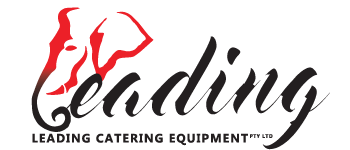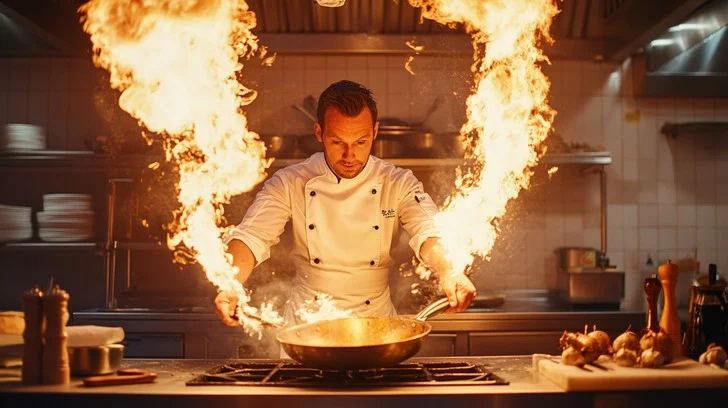In commercial kitchens, high-temperature commercial kitchen equipment is essential. It speeds up cooking, improves food quality, and ensures quick service. However, working with such equipment requires strict security measures. Without proper care, high-temperature appliances can lead to severe accidents. Burns, fires, and other risks are expected. Here are essential safety tips for handling high-temperature commercial machines.
Showcase your delicacy highlights to your customers in a beautiful way. Check out our Display Fridges here.
Understand the Equipment Fully
Before using any high-temperature appliance, understand how it works. Read the user manual carefully. Each appliance has unique settings and security features. Know these to avoid mistakes. Follow manufacturer guidelines for best practices.
Wear Proper Protective Gear
Protective gear is essential in a high-heat kitchen. Always wear heat-resistant gloves when handling hot items, and use long sleeves to protect your arms. Non-slip shoes are also crucial. They prevent slips and provide a firm grip on the kitchen floor. Aprons help, too, as they shield against spills and splashes.
Regularly Check Equipment
Regular inspections can prevent accidents. Check for signs of wear, damage, or malfunction. Worn-out parts can cause malfunctions or overheating. For example, check electrical cords for fraying or cracks. Look at gas connections to ensure there are no leaks. Identify issues early to avoid hazards.
Maintain Proper Ventilation
The high-temperature product generates heat and fumes. Proper ventilation keeps the kitchen safe. Use exhaust fans and hoods to clear the air. Good ventilation reduces the risk of smoke and odour buildup and helps control temperature levels in the kitchen. Keep ventilation systems clean and in good working condition.
Keep the Area Clear
A messy kitchen can enhance the risk of mishaps. Keep the area around high-temperature commercial catering equipment clear. Remove any flammable items, like towels, paper, or plastic. Ensure there’s enough space for safe movement. Clean up spills promptly to avoid slipping.
Practice Safe Lifting Techniques
Hot pans and trays can be heavy. Practice safe lifting techniques to avoid strain or burns. Use both hands to hold heavy items securely. Carry with your legs, not your back, to avoid accidents and injuries. If possible, ask for help with large, hot items.
Avoid Loose Clothing
Loose clothing can be a hazard in high-heat kitchens. It can catch fire or get caught in equipment. Avoid baggy sleeves or scarves. Instead, wear fitted clothes that won’t interfere with your movements. This small step reduces the risk of accidents.
Use Equipment-Specific Tools
Use the correct tools for each piece of appliance. For example, use tongs or spatulas, not bare hands, to handle hot grills. Don’t use kitchen towels to handle hot pans; use heat-resistant mitts instead. Following this tip helps prevent burns and other injuries.
Always Be Mindful of Open Flames
Some commercial equipment uses open flames, which adds another layer of risk. Keep a close eye on open flames, never leave them unattended, keep flammable materials far from the flame, and ensure fire extinguishers are nearby and easily accessible.
Be Cautious with Oil and Grease
Oil and grease are standard in commercial kitchens. However, they’re also significantly flammable. Be cautious when working with them near high-heat products. Avoid spills and clean any grease buildup on the machine regularly. Dispose of used oil safely and store it away from heat.
Check Temperature Settings Carefully
High-temperature commercial kitchen equipment for sale heats quickly. Check temperature settings before starting. Use the right heat level for each task. Overheating can damage food and increase fire risks. Follow recipes or standard guidelines for safe temperature levels.
Use Hot Pads and Mitts Properly
Hot pads and mitts are essential safety items. However, they need to be dry to work effectively. Wet pads conduct heat quickly, leading to burns. Check that the mitts are dry and in good condition. Change them if they display symptoms of wear.
Allow the Product to Cool Down
Allow time for equipment to cool after use. Never touch or clean appliances while they’re still hot. Some high-temperature equipment stays warm for a while after being turned off. Wait until it’s cool to clean or service it. This helps avoid burns and makes cleaning easier.
Train Staff on Safety Protocols
Every team member should know the basics of kitchen safety, and train your staff to use each piece of high-temperature products properly. Include training on emergency procedures. Regular safety drills help prepare staff for accidents or fires.
Never Overload Equipment
If you shop commercial kitchen equipment that is high-heat, overloading it can lead to malfunctions. Place only the recommended food in ovens, grills, or fryers. Overloading causes uneven cooking and can lead to overheating. Follow appliance guidelines for load limits to ensure safety.
Prepare food safely & quickly in your pantry for quicker service. Browse our Burner Cooktops range to take a better decision.
Stay Alert During Use
High-temperature offerings require focus. Avoid distractions when using it. Stay near the equipment and be aware of your surroundings. Ask another staff member to monitor the appliance if you need to step away. This step avoids mishaps and confirms smooth operations.
Turn Off Equipment When Not in Use
Turn off appliances when not in use. Even brief breaks should include powering down. This step prevents unnecessary heat buildup and lowers the risk of fires. Ensure all team members make it a habit to switch off products when finished.
Clean Equipment Regularly
Regular cleaning is essential for safe operation. Grease and debris buildup can affect performance and increase fire risks. Schedule regular cleaning for all high-temperature equipment. Use appropriate cleaning products and avoid harsh chemicals that might damage the appliance.
Store Cleaning Chemicals Safely
Many cleaning chemicals are flammable. Store them away from high-heat new or second hand kitchen equipment in labelled containers to avoid confusion. Ensure the storage area is cool and dry to reduce the risk of chemical reactions near heat sources.
Keep First Aid Kits Accessible
Accidents happen even with precautions. Keep a first aid kit within reach. Ensure it includes burn creams, bandages, and other essentials. Train staff on basic first aid to quickly respond to minor injuries.
Ensure Fire Safety Equipment is Functional
Every commercial kitchen should have fire safety offerings, including fire extinguishers, blankets, and smoke alarms. Check these regularly to ensure they work, and place fire extinguishers near top heating products for quick access.
Avoid Water on Oil or Grease Fires
If an oil or grease fire occurs, never use water. Water makes oil fires worse. Instead, use a fire extinguisher or cover the fire with a metal lid. Educate all kitchen staff on this important safety rule.
Keep Cords and Wires Organised
Electrical cords may be present in high-temperature commercial kitchen equipment. Keep them away from hot surfaces. Frayed or exposed wires can be a hazard. Inspect cords regularly and replace them if they show wear or damage.
Use Timers to Avoid Overheating
Timers are helpful in busy kitchens. They can prevent overcooking or overheating equipment. Set timers to remind you when food is ready, or machine should be turned off. This helps prevent accidents caused by forgetfulness.
Bring a long-lasting product in your kitchen that saves you from splashes & splotches. Check out our Workbenches with Splashbacks.
Secure All Items on Shelves
High-heat areas can cause vibrations, especially near heavy appliances. Secure all items on nearby shelves to prevent them from falling and creating hazards. Also, check storage racks and ensure they’re stable.
Conclusion
High-temperature products boost efficiency but requires caution. These safety tips can minimise risks and ensure a safe, productive kitchen. Your team can work confidently and safely around high-heat appliances with proper training, protective gear, and attention to detail.






